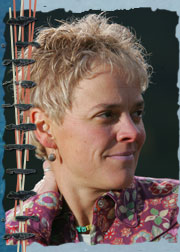<< Return to Articles and Reviews
Cori BrewsterLarge Bird Leaving
The large bird leaving in the title of Cori Brewster’s new CD is definitely not a trumpeter swan since her calls are not limited to mating for life. No, this bird's songs have an expansive range and are more like a great grey owl with its wisdom or a blue heron with its precise and patient step. Flying over land that feels both recognizably Canadian and new and unfamiliar, the CD reflects the whimsical and layered imagination of an eclectic and mature songwriter. Large Bird Leaving meditates on both beauty in a dark country and its underside, the darkness lurking in beauty. From songs like “Dark Country,”“She’s Still Beautiful” and “Look for the Sun” that explicitly address such themes, to the more existential and spiritual reveries, the CD’s overall tone could be best described oxymoronically as cynically optimistic. Neither sweetly optimistic nor darkly cynical but rather, a cross-breed between them, Large Bird’s maturity dwells in its acknowledgment of life’s limitations while it still dares to hope. Like the speaker of “Broken Compass,” Large Bird Leaving is “looking for the beauty/ looking for the meaning/ looking for some sort of sign” yet has the intelligence to recognize such meaning and signs come in small bursts of sun, often coupled with clouds of ambiguity and imperfection. The point is not to arrive at meaning, but to wink at the Buddha lurking in the back yard and to be brave enough to hop on its back for wherever the journey takes you.
Brewster’s mature imagination is not only displayed by her explicit themes though it is there too: for instance, in the difficulty of balancing domestic and creative lives, in the acknowledgment of loss, and in the brooding irony behind the “Good Catholic Girl”. However, her unlikely marriage of comedy and tragedy also emerges when tragic lyrics are paired with comic music or vice versa. This dissonant mood is perhaps strongest felt listening to “Philosopher King” where the quick cheerful rhythm is matched with the story of a homeless man, Cal Leavitt, who died on the streets of Calgary. The result is a brilliant testament celebrating Leavitt, his accomplishments and his eccentricity, yet one that also recognizes the politics of poverty. A more naive and earnest voice would have rendered Leavitt’s story a didactic lesson but Brewster’s vivacious song breathes both beauty and darkness into his life. I hear a similar tension in “Push you Away,” my favorite song on the CD, where the desire to break away from a lover is accompanied by a steady whispering drum beat that reminds us there is a before and after to ourselves outside of our relationships (the song, itself, has an after in that I kept humming it for days after I heard it).
The darkness in these songs – the “imperfection” Brewster sings about so sweetly you almost forget that the world is imperfect – is not answered with grand polemics or superman tactics (though her songs often have a political edge and superman does make an appearance in “Let’s Fly” even if only to fall down like us all). The antidote to darkness is life’s gift of spontaneous and random acts of beauty: the gift of friendship in “Gandhi/Buddha,” the “beauty behind the lines” in “She’s Still Beautiful,” and the sun “through the pouring rain” in “Look for the Sun.” The trick is to “open up your eyes,” and to listen to Casanova who counsels us to “be brave enough to lose your way,” to rip up the map, never travel the same way home and journey into the unknown. You might be surprised by what you find when you do not look with purpose but rather open yourself up to seeing – and, I would add, open yourself up to hearing Large Bird Leaving.
Katherine Binhammer
Music Lover
Professor of English, University of Alberta

